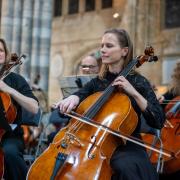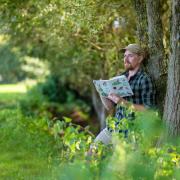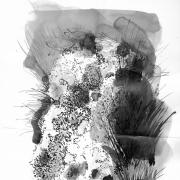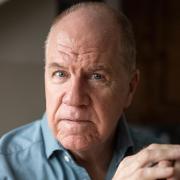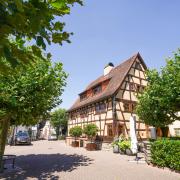PHILIP DALLING recalls two Exmoor legends who shared a deep love of the moor and its natural resources, and gained national fame through the media
Exmoor will never be the same without Johnny Kingdom, one time wild man turned wildlife champion, who after a life-changing accident laid aside his poaching gear to stalk the birds and beasts of the moor through the lens of a camera.
Born in High Bray in 1939, he followed his father into the local quarries, into the role of parish gravedigger and into the pursuit of poaching.
A serious accident whilst working as a lumberjack not only threatened his physical strength but temporarily destroyed his confidence, an experience he later described as a shock that had run through his system like a bolt of lightning, “making me afraid of life itself”.
The depression lifted when a friend loaned Johnny a video camera. He headed for Exmoor, spotted a herd of deer and used his old stalking skills to approach as close as possible. Now the implement he held above his head was a camera and not a rifle. Returning home, he realised that his experience on the moor, filming the wild creatures, had brought him back to life.

Selling videos and photographs in markets and at events across North Devon, his talent and unique personality were eventually recognised by television producers, and his fame became national as well as local.
His television documentaries thrilled viewers not just for the quality of his work but also for the infinite patience he displayed whilst setting up the shots and waiting for the creatures – deer, hares, badgers and adders (he disliked snakes) – to appear.
That ability to put himself in the right spot, be still and wait, first instilled in him as a child when his father called him to watch how a cuckoo patiently infiltrated a sparrow’s nest, was described by Johnny as the most important skill he possessed.
Johnny Kingdom died in September 2018, aged 79, following an accident with a digger on his land at Knowstone.

Hope’s legacy
Hope Bourne, like Johnny Kingdom, came to live in harmony with the environment of Exmoor as a result of misfortune.
When the death of her mother left Hope with no home, qualifications or income, she returned to the moor to live on and with the land, in a manner as self-sufficient and self-reliant as possible. For many years she lived in a simple caravan at Ferny Ball, a deserted farmstead near Withypool, with no services or conventional comforts.
Hope, who died in 2010, also gained national attention in the late 1970s and 1980s, with a series of newspaper interviews and television programmes. These misleadingly portrayed her as a noble figure living a romantic wild life; in reality her manner of living, which despite its frugality was far from reclusive, was forced upon her by circumstance rather than by choice.
To celebrate her centenary, the Exmoor Society has published Hope Bourne’s Reflections in Words, available from the Society’s headquarters in Dulverton (exmoorsociety.com).
The editor of the anthology, Lisa Eden, says: “I have selected pieces which show Hope revelling in Exmoor’s storms and silences, and in the drama of raging seas at Hartland, where she spent her early years. In her work Hope pays tribute to friendship – both human and animal.”



